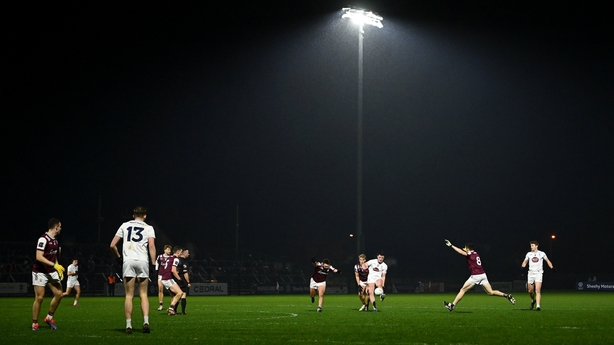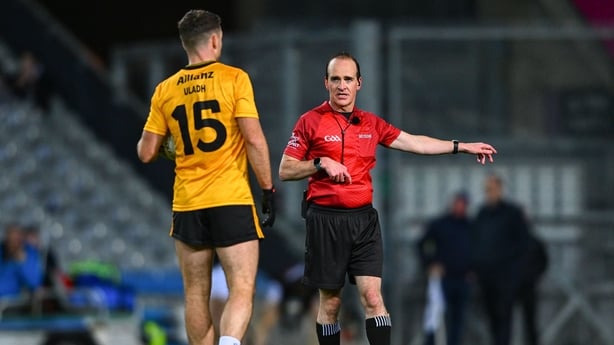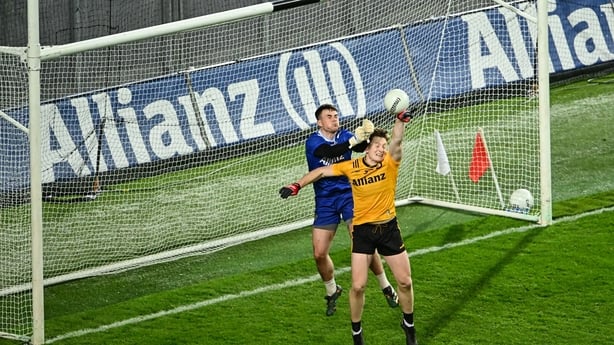The challenge matches and the sandbox games are done.
The Football Review Committee's much-trumpeted 'enhanced' rules really get tested in earnest this weekend.
It was clear that delegates at Congress had seen enough sideways passing to last a lifetime and voted through the new rules with the type of majorities that Saddam Hussein used to achieve during his pomp.
The potential for confusion and chaos and indeed consternation is ever present.
Here, folk of a certain age may remember back when yellow and red cards were debuted in the 1999 championship and we were treated to the spectacle of six players being sent off in a game between Westmeath-Carlow, before the authorities clarified the circumstances in which cards should be doled out. This generated quite the furore at the time.
The verdict on the rules thus far is mostly positive, however there could yet be a few snags. Let us run the rule over some potential points of contention.
The 16th man becomes the fifth official
Crowds growing accustomed to a new rule sometimes resemble undergrad psychology students encountering Freud for the first time. They suddenly start seeing examples of the infraction all over the place.
We saw this with the black card, when match-goers became disposed to demanding a black card at every conceivable opportunity, sometimes even in cases where a red card offence had just been committed.
The recent challenge match between Kildare and Galway in Newbridge showed the potential of the crowd to involve itself in the application of the new rules.

The Irish Examiner reported that the atmosphere resembled a "panto" with the home crowd in the stand repeatedly drawing the attention of referee David Gough and his linesmen towards the fact that one of Galway's trio of designated inside forwards had drifted outside his area.
This yielded a couple of handy points for Kildare, who were awarded tap-over frees, partly, it was suggested, on the strength of their supporters' protests.
The tiny Galway crowd in attendance tried to respond in kind. Either they were chancing their arm or the officials didn't whip around in time to check but no free was granted.
Speaking to RTÉ Sport this week, Gough said that referees would be reliant on their umpires for monitoring the adherence to the 'three up-top' rule.
"We will have to abdicate responsibility and hand over the adjudication of that to linespeople or to fourth officials. We just will not be able to see it," Gough said.
Cult of civility gone mad
While the majority of the new rules have won favour of the playing population, there is one that is already provoking disquiet among the playing body, particularly those of a defensive bent.
The edict requiring that a player must hand the ball to the opposition "promptly and respectfully" when a free is awarded.
The Robbie Kelleher rule, as no one is yet calling it.
Kerry's Diarmuid O'Connor finds this rule so unfathomable and difficult to accept that he suggested the other day that it was at odds with human nature.
While the word 'respect' has been all the rage in recent times, there's a view developing that this rule is taking the cult of civility a bit far.
We don't want the bouldness and snarl and bite removed from the game altogether, surely?
This isn't soccer either
The clampdown on back-chat has gone into overdrive with referees licenced to bring the ball forward a whopping 50 metres if they hear any lip whatsoever.
For those players for whom the exclamation 'Ah f**k sake, ref!' is as much a reflex as anything else, this could be a rough adjustment period.
The severity of the penalty should ensure that referees will soon be officiating in an atmosphere of respectful silence - from those within the white lines at any rate. They could even be treated to displays of obsequious flattery. It can't be long before they're being addressed as 'sir'.

On the other hand, the severity of the penalty could also encourage teams to engage in an increasingly creative brand of shenanigans.
We've heard evidence of this in the winter challenge matches. The Irish News reported that in a recent challenge game, Antrim players were left bemused and outraged when an opposition player "discreetly" adopted a Belfast accent and got a free moved forward by 50 metres.
This opens up glorious possibilities in the field of skulduggery.
Given that this is occurring in challenge matches, we imagine it'll be happening in a competitive game near you soon.
If a previous generation of players took the trouble to scrawl girlfriends' phone numbers on their arms, then throwing on an auld accent is hardly that much of a leap.
How long before we hear that such and such have drafted in a highly regarded dialect coach over the off-season?
Will Westmeath call up Conor Moore?
When Kerry go up to Celtic Park, will one of their number cry when the ref's back is turned, "here, yer giving them a wild lot of frees, hi! I'll kidnap yer wains if yer not careful!"
Cynical mimicry could yet become the much lamented scourge of the game ahead of the 2026 campaign.
Of course, it's also possible that a guilty man on the Antrim team was looking to escape blame and concocted this whole scenario.
Will goals retain their premium value?
"Well done to whoever won that one," the BBC's legendary broadcaster Jackie Fullerton is reputed to have said, having been obliged to read out a particularly goal-tastic scoreline from the Church and General National League as it was then (lookit, it's probably apocryphal).
It's unlikely he'd have found the four-point goal any easier.
The mathematically unsure of themselves were amongst those most relieved when the FRC chose to drop the four-point goal proposal in the wake of the revived interprovincial championship.
One reporter in here, who shall remain nameless, did once announce in their news package that "the teams were level at the break, 1-08 to 0-12".

Rian O'Neill has confirmed he spent much of the Ulster-Connacht game roaring back at Aidan Forker to tell him how much was in it.
So, the four-point goal is gone but the two-point arc remains.
This raises the question as to whether goals will retain their premium value, their previous dramatic impact, under the new dispensation.
We've seen in the last decade of rampant point inflation in hurling that Limerick, for a time, abandoned any interest in working goals for periods, confident they could zing over three long-range points in rapid quick time in any case.
A couple of successful long range kicks is now worth more than a goal going forward.
On the flipside, the two-point arc might provoke defences into pushing out, creating more space in behind. Who knows? We may see more goals than before, with defences more cavalier about shipping them, given the potential to wipe them out quicker.
"I would hope that they would remember that we're learning too..."
Before the off, a plaintive plea from David Gough, reminding people that it's a learning process for everyone.
"I hope that they (fans) would remember that we're learning too, as well as the players. And that there might be a little bit more scope for referees to make mistakes for the first few rounds of the National League."
We're not sure the referees should get their hopes up on that score.
Watch Galway v Armagh in the Allianz Football League on Saturday from 4.45pm on RTÉ2 and RTÉ Player. Follow a live blog on rte.ie/sport and the RTÉ News app. Listen to Saturday Sport on RTÉ Radio 1.


